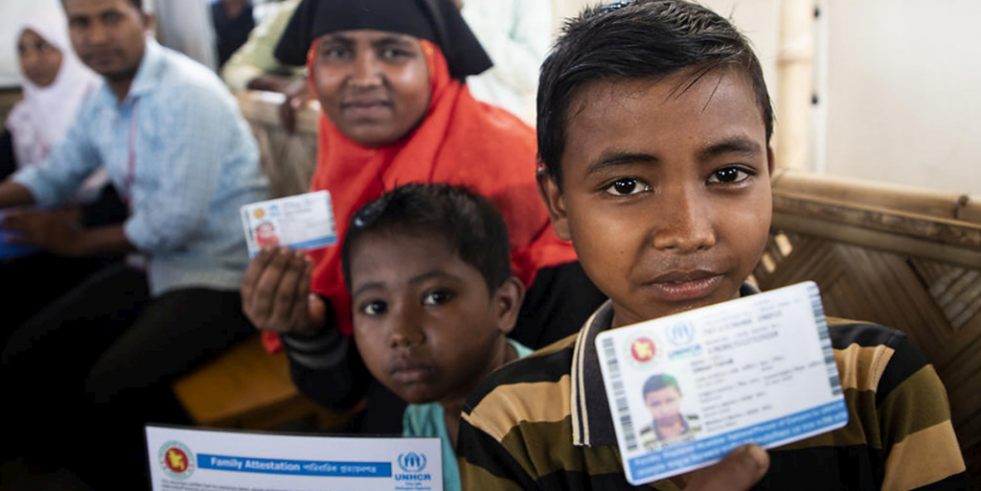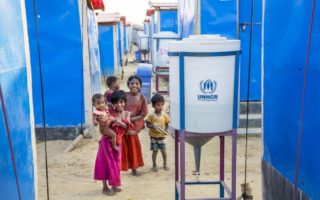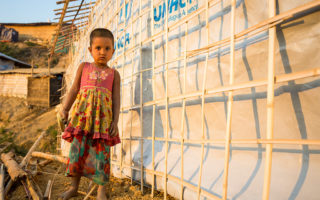
A family of Rohingya refugees hold up their identity cards after completing a UNHCR-run registration process at Kutupalong refugee settlement, Bangladesh. © UNHCR/Will Swanson
More than 270,000 stateless refugees from Myanmar provided with identity cards in an ongoing registration drive.
By Alex St-Denis in Cox’s Bazar, Bangladesh
Nasima Aktar is among hundreds of thousands of stateless Rohingya – many of whom have spent a lifetime without official documentation – for whom getting an official identity card is a significant step.
“We want documents for Rohingyas. This is our document,” says Aktar, who recently received a plastic identity card bearing her basic biodata, photo and country of origin in a registration drive in Bangladesh.
There are more than 900,000 Rohingya refugees like Nasima living in crowded settlements in southeast Bangladesh of whom an estimated 741,000 have fled a violent crackdown by the Myanmar military since August 2017.
“Having an identity is a basic human right … it’s also an incredible step into a more dignified life.”
Despite living in Myanmar for generations they were not able to acquire formal citizenship and documentation that comes with this, leaving them stateless and deprived of basic rights.
She is now among more than a quarter of a million Rohingya refugees who have been registered in a push since June last year by UNHCR, the UN Refugee Agency, in support of the Bangladesh government, in an effort that also helps to safeguard their right to voluntarily return home to Myanmar.
“Having an identity is a basic human right,” said UN High Commissioner for Refugees Filippo Grandi during a recent visit to Cox’s Bazar. “And remember: many of these people, all their life, did not have a proper identification. So, for them, it’s also an incredible step into a more dignified life.”
To date, a total of 270,348 refugees have been registered in the settlements of Ukhia and Teknaf Upazilas. On average, over 4,000 refugees are being registered a day in the exercise, with the aim of concluding the registration of all those in the settlements late this year.
The exercise also improves the accuracy of data on refugees in Bangladesh, which will help the authorities and humanitarian partners to better understand the needs of the refugee population. It will allow them to plan and target assistance more effectively, particularly for vulnerable groups such as children, women, and those with disabilities.
Refugees are registered using biodata and biometric data, including fingerprints and iris scans to provide them with a unique identity. At the end of the registration process, refugees receive a plastic ID card that includes a photo, and basic information such as date of birth and gender. Only refugees over the age of 12 receive the card but families also receive an attestation showing the details of all family member.
All information on the documents is in English and Bengali and indicates Myanmar as the country of origin. The documents were developed in cooperation with the Bangladesh government and carries both government and UNHCR logos.
“They understand that this exercise has nothing to do with forcible return,” UNHCR registration officer Nurul Rochayati explains. “This exercise is to establish their protection in here, and to establish their right to return. They will return when they’re safe, in safety and dignity.”
To better explain the benefits of registration, UNHCR and the Bangladesh authorities in recent months held meetings with the community including with leading Rohingya figures, such as imams, elders and teachers. Community outreach teams, that include refugees, go out regularly to talk about the registration process and encourage people to attend.
With the cyclone season underway, registration will also help reunite families in case they get separated during storms.
Originally published by UNHCR on 17 May 2019





